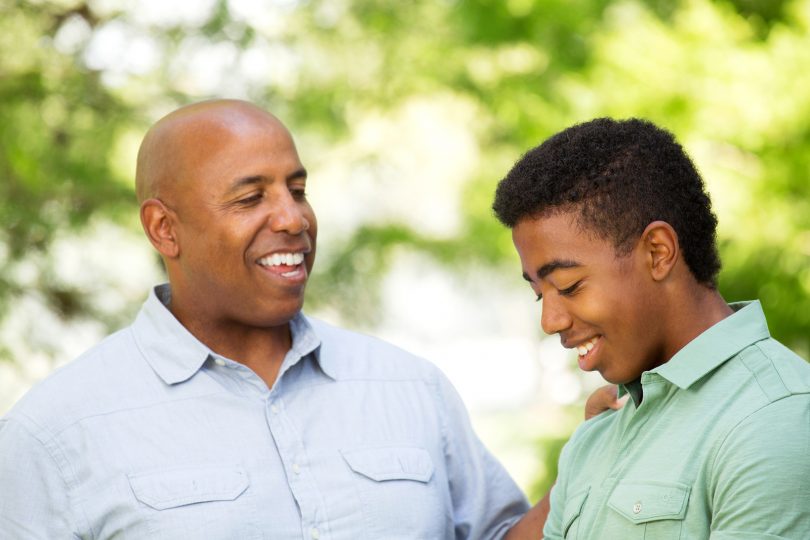Dr. Zachary Klaassen is the father of a 7-year-old son. “The talk” is probably still about five years away, but he’s already planned what he’s going to say. And it’s going to include a few words about testicular cancer.
Wait. What?
“Many parents may not realize that the highest rates of testicular cancer are for young men between the ages of 15 to 39,” said Klaassen, who is also a urologic oncologist at the Georgia Cancer Center. “That’s why I think it’s important for every parent of a boy to talk to them about doing self-checks.”
Here’s what to say
If you think it’s awkward enough to talk to your 12- or 13-year-old son about sex, throw testicular cancer into the mix. “But having a dialogue when they’re 16 or 17, that’s too old to get them into the habit of checking for it,” said Klaassen. “But when they’re 12 or 13 and they’re already going through puberty and changes? It’s a good time to tell them that if something feels abnormal, that they need to have someone check it.”
Let’s be frank: Your son may be doing some exploration in that area already. So it’s important to make them aware that if anything starts to feel different, they shouldn’t feel embarrassed about telling you. By different, Klaassen means a lump or mass that could be subtle or could be large and firm, anything from a golf ball or ping pong ball to a little rock.
If something has changed, your first stop should be to your son’s pediatrician or another primary care provider, who can provide a referral to a urologist if necessary.
The good news, said Klaassen, is that testicular cancer isn’t that common when you compare it to all the other cancers out there. But it is one of the more common cancers in men in the 15 to 39 age group.
Guys at highest risk are those who were born with an undescended testicle, especially one that was surgically repaired after ages 5 or 6. Anyone with a family history of testicular cancer is also at higher risk. But then there are the guys with no medical conditions or family history who end up getting diagnosed.
Which is why Klaassen can’t say it enough: “When you’re a young, healthy guy, it’s not something you think about. But all boys should know about this.”
What happens if there’s a diagnosis?
Any diagnosis of cancer—especially such a personal type of cancer, in someone so young—is incredibly hard.
“They’re shocked,” Klaassen said, “so we do a lot of handholding with them and their families, and then depending on what stage they’re in, we give them a very specific treatment algorithm so that they can be very engaged in their care and know what’s coming.”
Finding testicular cancer early, when it’s in Stage 1, means there’s an 85 percent chance that the cancer can be fixed with a simple surgery, no chemotherapy or radiation, and no impact on fertility. Sometimes testicular cancer grows slowly, but sometimes it’s fast, which is why regular self-checks—and not waiting to talk to a doctor if there is a lump—is so important.
For cancers that are stage 2 and up, chemotherapy and radiation will most likely be involved. “Chemotherapy is so good for this type of cancer that there’s a 99 percent survival rate after five years,” said Klaassen.
But, there are side effects. After diagnosis, most young men ask questions like “Am I going to live?” or “What’s treatment going to be like?” Klaassen is usually the one who brings up fertility. While having a child may be the last thing on an 18- or even a 26-year-old’s mind, anyone who thinks there is the slightest chance they will want a family in the future should consider sperm banking since chemotherapy and radiation can affect fertility.
Also, most cancers happen to people when they’re older. But teens and young men have years to live, which means they may also see some side effects from treatment 20 or more years down the road. Chemotherapy and radiation can lead to a higher risk of blood cancers, heart disease, numbness and tingling in the fingers and even hearing loss. “We can cure them, but not without risk of long-term side effects,” said Klaassen.
What’s new now is research into biomarkers that will help doctors know which patients will respond best to certain treatments, “which is streamlining care,” said Klaassen.
Klaassen puts a high priority on mental health too. “In patients who have been diagnosed with cancer, there’s an increased risk of depression and suicide too. So we have a good dialogue and look for signs of depression and being closed off.
“These guys are in the peak of their life and then are hit with this? It can be a difficult thing to process.”
But Klaassen also emphasizes this: “It’s also important to remember that testicular cancer is very treatable. But all boys, all teens, all young men—they need to do regular checks.”




